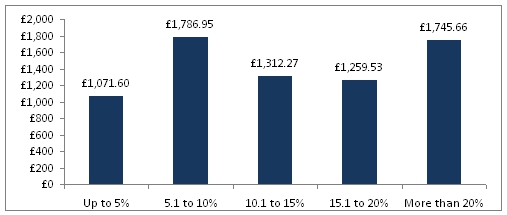 The AV referendum is now only a week away. In previous posts, Alan Renwick from the University of Reading has debunked some of the myths advanced by the ‘No’ campaign: that AV violates the principle of ‘one person, one vote’ and that it would lead to permanent coalitions. Here, Dr Renwick casts doubt on four of the contentions from the ‘Yes’ campaign about how a vote for or against changing to the Alternative Vote would affect the character of British political life.
The AV referendum is now only a week away. In previous posts, Alan Renwick from the University of Reading has debunked some of the myths advanced by the ‘No’ campaign: that AV violates the principle of ‘one person, one vote’ and that it would lead to permanent coalitions. Here, Dr Renwick casts doubt on four of the contentions from the ‘Yes’ campaign about how a vote for or against changing to the Alternative Vote would affect the character of British political life.
Contention 1: AV would eliminate safe seats
A safe seat is one that a particular party is very unlikely to lose over successive elections. The claim made by some AV supporters that a change in the voting system would eliminate safe seats is wrong. Seats where one party regularly scores over 50 per cent of the vote will generally be little affected by AV and so will probably remain safe. Even some seats where the winning candidate does not always secure more than half the votes under first past the post (FPTP) will be safe because there is a clear majority for the left or the right.
AV would make some seats that are currently fairly safe less safe. In recent elections, this would have been most likely in Conservative-held seats where both Labour and the Liberal Democrats won substantial votes.
But AV would also make some seats safer. This is clearest for many Lib Dem seats: the Lib Dems’ hold would likely be strengthened by lower preferences. In recent elections it would also have applied to some Labour-held seats where the Conservatives came second and the Liberal Democrats were a strong third.
AV’s tendency to exaggerate landslides means that, overall, it would somewhat reduce the number of safe seats: for example, Labour would have picked up even more Conservative seats in 1997. But the change should not be exaggerated: the structure of competition in most constituencies is unlikely to change radically.
Contention 2: This is important because MPs in safe seats are more likely to misbehave
Evidence from international comparisons suggests that one form of corruption – exploiting public office for private gain – becomes more common when MPs feel safer in their seats. But another form of corruption – buying votes – is more likely where MPs have to fight hard to keep their jobs. This implies that action designed to tackle the first form of corruption (into which the worst excesses of the expenses scandal fell) might just encourage the second form.
Furthermore, there is very little evidence that MPs were more likely to be implicated in the 2009 scandal over expenses if they occupied safer seats. Early analysis conducted by a Liberal Democrat blogger did find a correlation and received much media attention. But later analyses based on the sums that MPs were actually required to repay by Sir Thomas Legg have found no clear correlation with the safety of the MPs’ seats. The Figure below shows the average repayment required for MPs with majorities in the 2005 election of different sizes. While MPs with the safest seats did have higher repayments than those with the most marginal seats, there is no clear pattern across the categories.
Average expenses repayment per MP, by size of majority

Contention 3: MPs have to “work harder for us” under AV
The pro-AV campaign claims that it would make MPs “work harder for us” because it would require them to seek support from a wider constituency of voters, going beyond their usual party supporters, in order to gain at least 50 per cent of voters in their constituency. Evidence from the UK and elsewhere suggests that MPs in marginal seats do focus on servicing their constituency more than those in safe seats. Insofar as AV reduces the number of safe seats, it could therefore be expected to increase MPs’ constituency focus.
It can be asked, however, whether this is a good thing. Westminster MPs already devote a great deal of their time to constituency activities. This reduces the time they can spend scrutinizing government at the national level. A recurring theme in current reform debates in Ireland is that politicians there have been too focused on local matters and failed to notice the national policy mistakes that led to the banking crisis. Whether we should want MPs to “work harder for us” at the constituency level is therefore a matter for debate, and some MPs certainly feel they work hard enough already. Recently, Labour MP Ian Murray said:
As an MP who does 152 advertised surgeries a year, not including home visits and other surgeries, works 16 hours a day and looks upon a Sunday as the 7th working day of the week, I really take exception to people saying that AV will make me work harder.
Contention 4: AV would reduce the tribalism of party political battles
In debates about electoral systems around the world, AV has been backed by some political scientists as the best system for overcoming ethnic or other tensions: they argue that AV can force politicians to broaden their appeal to voters outside their own group. That is why it was introduced in Fiji and Papua New Guinea.
In the UK, AV will increase some MPs’ incentive to appeal to supporters of some other parties. But there is no reason to expect a sudden move towards civility in relations between the two main parties. This expectation fits the pattern observed in Australia. On the one hand, as Ben Reilly observes, “Allowing voters to indicate a range and gradation of preferences between parties and candidates, rather than a single ‘one-shot’ choice, creates incentives for political actors to reach out for secondary preference votes and thus to bargain, cooperate and compromise in search of electoral victory.” On the other hand, each of the two main parties generally urges its supporters to rank the candidate of the other main party last: there is no love lost between them.
Thus, the main political battle remains just as intense and hostile as under FPTP: political discourse in Australia is at least as combative as it is here. A recent exchange in the Australian parliament over climate change policy between opposition leader Tony Abbott and prime minister Julia Gillard will serve as an example. Gillard, said Abbott, “has almost no familiarity with the truth”. He likened her to Richard Nixon, who was said to have lied whenever he opened his mouth. He called her “delusional” and “in full Napoleon mode”. Gillard responded that Abbott was a “bitter, hollow man” displaying “puffed-up arrogance” with whom Australians were increasingly “disgusted” and “revolted”. This type of rhetoric is one thing that AV is unlikely to change.
Please read our comments policy before commenting.





1 The elimination of safe seats is a democratic imperative, not because MPs will work harder or be more honest. No one should have guaranteed electoral success.
2 No electoral system can ensure the honesty of our MPs. But we should be able to vote against an MP, assuming he/she has the support of their party, without sacrificing our freedom to vote for that party to form the Government.
3 Do we want our MPs to work harder, or do we want better MPs? Most MPs work very hard, but it would be better to have an electoral system that encouraged the election of the MPs on merit regardless of party label.
4 Tribalism is probably in our DNA. Our ‘winner takes all’ electoral system encourages it. PR would almost certainly moderate it.
What we really need is an uncomplicated form of PR, simple to vote and simple to count, that encourages the election of MPs on merit, and that is going to take some time.